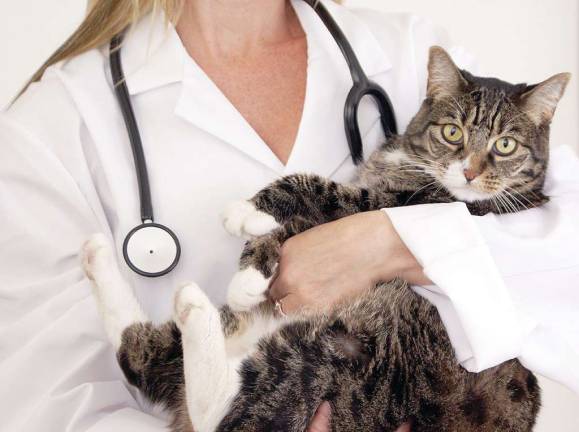Cats Can Hide their Ailments, So Annual Checkups Are Needed

It's no secret that cats don't like going to the vet. They are creatures of habit; they like peace and quiet, and being shoved in a carrier, loaded into a car or on the subway and dragged into a waiting room with barking dogs and funny smells is pretty much dead last on their list of priorities.
When cats get stressed, their owners get stressed. Suddenly, in the mind of the pet parent, the cons far outweigh the pros and another year goes by without a checkup. The cat claims success-cats like to gloat. While I truly appreciate the intellectual capacity of the cat, I don't think they should be making decisions about their own health care. However, in this instance, they have masterfully manipulated their human. I give them credit for that.
Despite the fact that cat ownership trumps dogs by 20 percent, cats visit the veterinarian almost half as frequently as dogs. In last year's Bayer Veterinary Care Usage Study, 40 percent of cat owners said they would not take their cat to the vets if vaccines were not needed. With feline vaccine requirements now cycling every three years, yearly checkups have become triennial at best.
The American Association of Feline Practitioners (AAFP) recently published a Feline Life Stages guideline. According to the AAFP, A 6-month-old kitten is the equivalent of a 10-year-old human, while a 2-year old cat has aged 24 human years and a 6-year-old cat is the Big 4-0! An adult cat ages about four years in every human year; when you delay a vet visit for three years, it's actually 12 cat years! A lot can happen in 12 years, wouldn't you agree?
Cats are Academy Award-caliber actors. They can hide disease well-it is a survival instinct. If we don't peek under the hood on a yearly basis, a lot can be missed. I can relay countless vet visits in which I have uncovered major disease processes in cats whose owners had not one shred of evidence that something was wrong.
Sometimes, these discoveries came too late to do anything about them. Fortunately, early detection gives more options. In addition, early intervention usually costs less in the long run.
I think there is a perception out there that cats are self-sufficient. They are not absolved from getting disease. Seventy percent of cats have some form of oral disease by the age of 3. Heart disease can often be silent. They are prone to diabetes and thyroid disorders. They can suffer quietly from painful arthritis. They get cancer. Four out of 10 cats are obese; obese cats live 1.8 years less than cats of a healthy weight. Veterinarians, as trained observers, can uncover some of these things by asking questions, completing a thorough physical exam and making recommendations for appropriate testing.
Frequent vet visits can improve quality of life and longevity. The AAFP recommends annual wellness exams at a minimum. Seniors and geriatrics or cats with medical or behavioral issues should anticipate semiannual visits or more. I would be remiss if I didn't recognize a major obstacle for pet parents: cost. Veterinary care is not cheap. However, there are some vets who offer wellness plans that allow for a year of service to be paid off in monthly installments. There are also a multitude of third-party vendors like Care Credit that offer low or no-interest financing. There is pet insurance.
As for logistics, some tips for making the trip to the vet more palatable for your cat include getting your cat acclimated to the carrier well before you dust it off for the annual visit. Leave it out for them to sleep in. A hard carrier that loads in from the top is recommended. This may allow for your vet to complete the physical exam within the carrier, which is now the safe zone for the cat.
Feliway, a pheromone that decreases anxiety, can be sprayed in the carrier. There are also some new products on the market that have good results in mitigating feline stress that you can discuss with your veterinarian. Inquire whether your vet has quieter times of the day that may be less of a sensory overload for your cat.
It may be the Year of the Dragon, but at the Animal Hospital at Bideawee we are declaring it the Year of the Cat. We've developed our special programs to make sure the cats of New York City get the health care they need-visit the animal hospitals at Bideawee or work with your veterinarian to keep your cat's nine lives intact.
Robin Brennen is chief of veterinary services